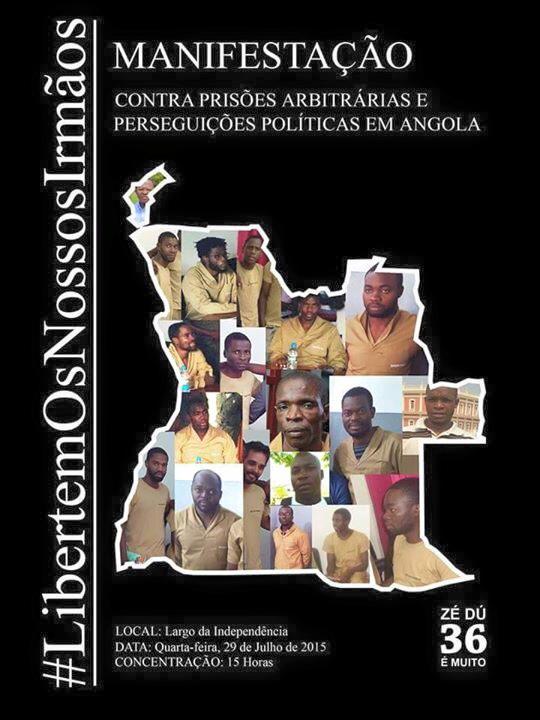#Free15Angolans: An update
You’d never know it from reading the US media, but 15 political prisoners in Angola are still in jail.

Free Our Brothers protest flyer
You’d never know it from reading US media, but those political prisoners in Angola are still in jail and Angolan citizens, activists, and a clutch of folks from other places are making noise about it.
A group of folks have started a video campaign demanding Liberdade Aos Presos Políticos Angolanos Já! (Freedom for the Angolan Political Prisoners Now!). Here’s the first video, you can find the other two on the Youtube scroll.
Rede Angola, a new voice in the Angolan independent press, has repeatedly published critical pieces. Check out these pieces (all in Portuguese) by Aline Frazão, Ana Paula Tavares, Luisa Rogerio, Reginaldo Silva, Agualusa, and Kalaf Epalanga. And Sergio Picarra’s fab drawings like this one.
Deutsche Welle has given the situation consistent coverage in its Portuguese edition. So has the Portuguese press (too many to link). Al Jazeera published this comprehensive piece. And the Brazilian press has published a bit, including this piece by internationally recognized writer José Eduardo Agualusa asking Brazilian democracy to be as forward looking as the Brazilian dictatorship was (as the first government to recognize independent Angola in 1975). A group of 17 academics published an open letter in Le Monde, The Guardian, and Público drawing attention to the human rights situation in Angola and calling on the French, English, and Portuguese governments and their allies to put principle before profit. Attempts to place the letter in the US press failed (navel-gazers).
And there has been more street action. July 29 witnessed coordinated protests in Luanda, Uige, Berlin, Brussels, and Lisbon. While the Lisbon protest seemed a boisterous affair (nearly 150 people gathered for 3 hours), full of signs, hugs, statements of solidarity, and good music, Luanda protesters met arrests, kidnapping, violence, police dogs, an MPLA organized counter-protest, and ear-splitting volumes of kuduro music blaring from giant speakers.
Police picked up (the official word was ‘collected’) nine key activists before they even arrived at the protest. They were driven outside the city, beaten, and left in another province to find their way home the next day. Luanda’s Police Commissioner António Sita, when contacted by Makaangola, claimed that they had not disappeared but were hiding out in the home of a man in Viana (a satellite city of Luanda), not answering their cell phones, and attempting to create “political facts.” Another eleven were arrested, according to Makaangola, when they were preparing signs for the protest at a home before heading to the Largo da Independência, where the action was scheduled.
Roughly thirty protesters managed to make it to the Largo. They were met with police intimidation, a canine unit, and a counter-protest organized by the JMPLA (the party’s youth organization) in celebration of African Women’s Day. Strange since protesters were mostly greeted by shouts accusing them of being “enemies of peace” and “fomenters of confusion.” Stranger still since it was the JMPLA who had mounted huge speakers, blasted loud music, and handed out t-shirts to passersby, some of whom were paid 2500 kwanzas (roughly $20) to don them, this in a square bordering a number of schools. Now who’s creating confusion on a school day afternoon?
If the right to assembly was routed so too was the right to expression. In the morning police arrested radio journalist Gustavo Vieira from Radio Despertar (the reinvention of UNITA’s former radio Vorgan) and surrounded the station. In the afternoon they chased Rede Angola journalists from the Largo. State media offered a predictable fare of news paralysis. For news analysis and breaking news, Facebook and Twitter (@CaipLounge and @RafaelMdeMorais) were best.
As we settle in to the weekend and the political prisoners remain in prison and a number of protesters are recovering from serious injuries at the hands of police, Angolans are on FB are lamenting the lack of enforcement of their constitutional right to assembly (the protesters applied for a permit to protest, as required by law) and noting how the imprisonment of young activists and the most recent protest have provided spectacular distraction from pressing issues of national concern: the decline in oil prices, the consequent massive budget deficit, the President’s still secret negotiations with China in May over the debt and a possible new line of credit, not to mention the state of public sanitation, declining employment figures, and inflation.
Others are pointing to the ruling party’s medo (fear). Activist Pedrowski Teca, one of the organizers of Wednesday’s protest, said as much. And he called the event a success, despite the troubles protesters faced and the fact that their goal – freeing their activist brothers in prison – was not yet achieved: #LibertemOsNossosIrmãos (#LiberateOurBrothers). More folks showed up, power shook in its boots and put its roughest and toughest in the streets.
Political insiders are talking about an impending split in the MPLA. One journalist described the current protests as the result of differences generated from within the MPLA. So it’s not surprising to see party loyalists publicly expressing dismay. That is, they simultaneously announce their loyalty and launch into a critique. Others do so vocally but not publicly, or only elliptically. Brave protesters in the streets have much wider and deeper support than their small numbers suggest.
- For two great analyses of the current political situation, see this one in English on Democracy in Africa, by Justin Pearce, and this interview in Portuguese with Jon Schubert by DW.



















